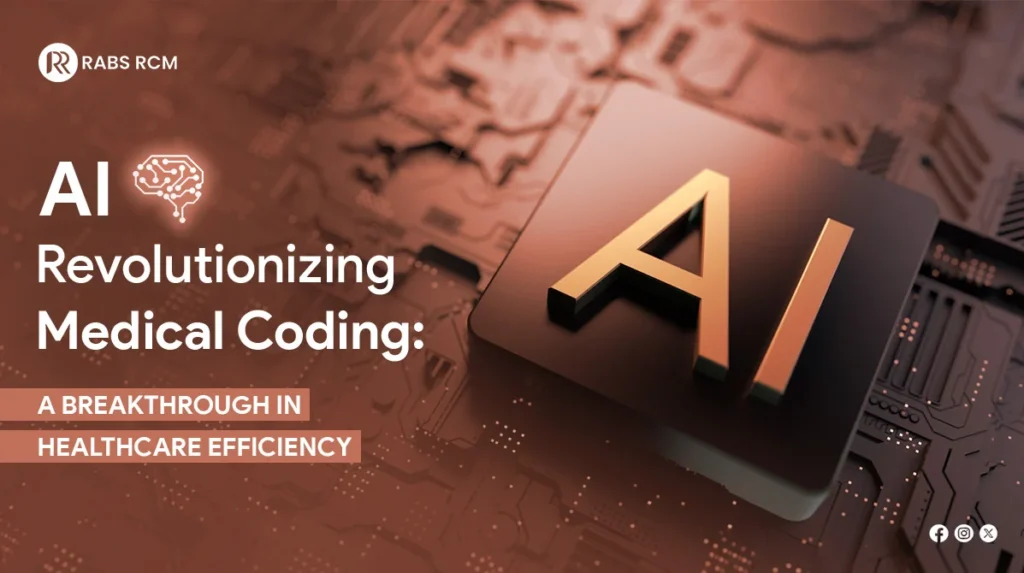
AI Revolutionizing Medical Coding: A Breakthrough in Healthcare Efficiency
In the rapidly changing healthcare realm, the fusion of artificial intelligence (AI) has led to notable progress, especially within medical coding. AI medical coding involves utilizing machine learning algorithms and natural language processing methods to automatically allocate standardized codes to medical diagnoses, procedures, and services offered by healthcare providers. This innovative method not only boosts the precision and effectiveness of medical coding but also simplifies administrative duties, ultimately enhancing patient care and billing procedures.
Benefits of AI in Medical Coding
Efficiency and Accuracy
One of the primary benefits of AI in medical coding is its ability to streamline the coding process, significantly reducing the time and effort required by human coders. By analyzing vast amounts of healthcare data, AI algorithms can quickly and accurately assign appropriate codes to medical records, ensuring compliance with industry standards and regulations.
Cost-effectiveness
AI medical coding offers cost-saving benefits for healthcare providers by reducing the need for manual coding and minimizing the risk of coding errors. With automated coding processes, organizations can optimize resource allocation and allocate personnel to more critical tasks, resulting in overall operational efficiency and financial savings.
Reduction of Human Errors
Traditional medical coding methods are prone to errors due to human oversight or fatigue. AI-powered coding solutions mitigate these risks by leveraging advanced algorithms to identify patterns and anomalies in medical documentation, thus minimizing the likelihood of coding inaccuracies and potential billing discrepancies.
Challenges in Traditional Medical Coding
Despite its widespread adoption, traditional medical coding presents several challenges that hinder operational efficiency and accuracy in healthcare organizations. Manual coding processes are inherently time-consuming and labour-intensive, often leading to delays in claims processing and reimbursement. Moreover, human coders may encounter difficulties in interpreting complex medical documentation or identifying relevant codes for uncommon medical procedures or diagnoses, resulting in coding errors and claim denials.
How AI Improves Medical Coding
AI technology addresses these challenges by automating coding processes and leveraging machine learning algorithms to analyze unstructured medical data effectively. By recognizing patterns and correlations within clinical documentation, AI systems can accurately assign appropriate codes to medical encounters, reducing the burden on human coders and expediting claims processing.
Applications of AI in Medical Coding
AI medical coding finds applications across various healthcare settings, including hospitals, clinics, and insurance companies. Some of the key areas where AI is transforming medical coding include:
Diagnosis code assignment: AI algorithms analyze clinical notes and diagnostic reports to identify relevant ICD (International Classification of Diseases) codes for medical conditions and illnesses.
Procedure code assignment: AI systems interpret surgical reports and procedural documentation to assign appropriate CPT (Current Procedural Terminology) codes for medical treatments and interventions.
Medical billing and claims processing: AI-powered coding solutions streamline the billing process by automatically generating accurate claims based on coded medical records, reducing billing errors and claim denials.
Future of AI in Medical Coding
As AI technology continues to evolve, the future of medical coding holds tremendous potential for innovation and advancement. With ongoing developments in natural language processing, predictive analytics, and computer vision, AI-powered coding solutions will become increasingly sophisticated, enabling more accurate coding and reimbursement processes.
Ethical Considerations
While AI medical coding offers numerous benefits, it raises ethical concerns regarding patient data privacy and algorithmic bias. Healthcare organizations must prioritize patient confidentiality and ensure compliance with data protection regulations when implementing AI solutions in medical coding.
Transparency and accountability are essential aspects of ethical AI practice, requiring healthcare providers to disclose the use of AI algorithms in coding processes and establish mechanisms for monitoring algorithmic performance and fairness.
Training and Education
As AI becomes more prevalent in medical coding, there is a growing need for training and education programs to equip healthcare professionals with the necessary skills to effectively utilize AI technologies. Medical coders must undergo specialized training to understand AI algorithms and leverage coding software effectively, ensuring accurate and compliant coding practices.
Regulatory Compliance
Regulatory compliance is critical in AI medical coding, as healthcare organizations must adhere to industry regulations and standards governing data security, privacy, and billing practices. AI coding solutions must comply with HIPAA (Health Insurance Portability and Accountability Act) regulations and other healthcare guidelines to protect patient information and ensure the integrity of coded medical records.
Cost Considerations
While the initial investment in AI medical coding may be significant, the long-term benefits outweigh the costs for healthcare organizations. By reducing manual coding expenses, minimizing coding errors, and accelerating claims processing, AI coding solutions offer substantial cost savings and revenue opportunities for providers, ultimately improving financial sustainability and patient care delivery.
Limitations of AI in Medical Coding
Despite its transformative potential, AI medical coding has its limitations, particularly in handling complex medical cases and rare diagnoses. In such instances, human intervention may be necessary to ensure accurate coding and billing practices. Additionally, AI systems require regular updates and maintenance to remain effective in dynamic healthcare environments, requiring ongoing investment and support from healthcare organizations.
Conclusion
AI medical coding represents a groundbreaking advancement in healthcare technology, offering unparalleled efficiency, accuracy, and cost-effectiveness in medical coding processes. By automating coding tasks and leveraging machine learning algorithms, AI solutions optimize administrative workflows, streamline claims processing, and improve patient care outcomes.

